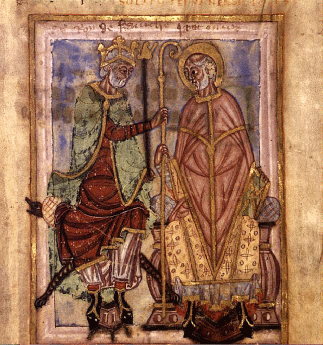Author
Title [Title in English]
source(s) mentioning (
link)
miscellaneous comments (if applicable)
|
ca. 1081 |
Sigebert of Gembloux |
Epistola contra Hildebrandum |
| ca. 1081 |
polemic |
Gembloux |
Sigebert of Gembloux
Epistola contra Hildebrandum [Letter
against Hildebrand]
mentioned by Sigebert himself, in
De
scriptoribus ecclesiasticis, PL 160: 587 (
link):
validis patrum argumentis respondi epistolae Hildebrandi papae, quam
scripsit ad Hermanum Metensem episcopum, in potestatis regiae calumniam.
Written as a response to Gregory VII's second letter to Bishop Hermann
of Metz, dated 15 Mar. 1081 (JL 5201: Registrum, 8.21).
|
1084 |
Theoderich of Tholey |
Libri duo contra Hildebrandum |
Theoderich of Tholey, abbot of Sankt Martin (1096–ca. 1130)
Libri
duo contra Hildebrandum [Two books against Hildebrand]
cf.
Gesta Treverorum (addit. et continuatio), c. 14, MGH SS 8: 188 (
link)
The
Gesta Trev. add that Theoderich was given the abbacy of
St-Martin as a reward for service to Engilbert, which included retreiving
the pallium from Clement III as well as writing this polemic.
Theoderich had earlier revealed anti-Gregorian tendencies in his
Passio
Cunonis (BHL 1922), c. 4, ed. G.H. Pertz, MGH SS 8: 217 (
link).
|
1084 |
Alberic of Montecassino |
Liber contra Henricum imperatorem de
electione Romani pontificis |
| 1084 |
polemic |
Montecassino |
Alberic of Montecassino
Liber contra Henricum imperatorem de
electione Romani pontificis [Book against emperor Henry on the
election of the Roman pope]
mentioned by Peter the Deacon in
Chronica monasterii Casinensis 3.35, ed. H. Hoffmann, MGH SS 34: 411 (
link)
Hoffmann does not provide additional comment.
|
1084–1085 |
Anselm of Lucca |
Epistola prima contra Wibertum |
| 1084–1085 |
polemic |
Mantua? |
Anselm of Lucca
Epistola prima contra Wibertum [First
letter against Wibert]
cf. Anselm,
Liber contra Wibertum,
MGH LdL 1: 520 (
link):
Scripsi tibi pauca cum multo dolore et sincerae caritatis affectu, ut cognoscens errorem tuum redires ad cor et poenitentiam ageres delictorum tuorum.
|
1085 |
Bernhard of Hildesheim? |
Relatio de conventu in villa
Gerstungen-Berkach |
Bernhard of Hildesheim?
Relatio de conventu in villa
Gerstungen-Berkach [Report on the meeting in Gerstungen-Berkach]
account partially reproduced in Annalista Saxo, ed. K. Nass, MGH SS 37: 472–474 (
link)
and
Annales Magdeburgeneses, ed. G.H. Pertz, MGH SS 16: 176–177 (
link)
The Gregorian account of the meeting, which Erdmann saw as Bernhard's.
Robinson
1978 discusses the possibility that a "Henrician account" of the same
proceedings also circulated.
|
1085 |
Wibert/Clement III |
Liber ad Anselmum |
Wibert, archbishop of Ravenna (1073–1100) / (anti)pope Clement III
(1080–1100)
Liber ad Anselmum [Book to Anselm (of
Lucca)]
cf. Anselm,
Liber contra Wibertum, MGH LdL 1: 525
14 and 527
12
(
link).
Two brief passages are quoted by Wido of Ferrara,
De schismate Hildebrandi, MGH LdL 1: 554 (
link).
|
1085–1086 |
|
Libellus "Deus noster, inquit apostolus,
ignis consumens est" |
| 1085–1086 |
polemic |
unknown |
Libellus "Deus noster, inquit apostolus, ignis consumens est"
fragments reproduced in the
Libellus "Cum rerum omnium"
from München, BSB, clm 618,
ed. I.S. Robinson, in
Studi
Gregoriani 11 (1977) 303–387.
|
ante 1086 |
Anselm of Lucca |
Commentarium in Psalmos |
| ante 1086 |
biblical commentary |
Tuscany |
Anselm, bishop of Lucca (1073–1086)
Commentarium in Psalmos [Commentary
on the Psalms]
An excerpt (on Psalm 2:2) is included in Paul of Bernried's
Vita Gregorii, c. 112, ed. J.M. Watterich (1862), 541 (
link)
cf.
Stegmüller 1372
|
ante 1086 |
Anselm of Lucca |
Lamentationes Hieremiae |
| ante 1086 |
biblical commentary |
Tuscany |
Anselm, bishop of Lucca (1073–1086)
Lamentationes Hieremiae [Lamentations of Jeremiah (Commentary)]
cf.
Stegmüller 1372.1
|
1089–1090 |
|
Epistola contra Clementem/pro defensione
Gregorii |
Epistola contra Clementem / pro defensione Gregorii [Letter
against Clement/in defense of Gregory]
fragments in
Liber de
unitate ecclesiae conservanda; see e.g. MGH LdL 2: 266 (
link):
Igitur aemulatores sive auctores scismatum, quae dudum facta sunt in
ecclesia pariter et in re publica, extant praecipue quidam, qui dicuntur monachi de Hirsaugia, ex quorum
scola pervenit ad nos haec, de qua tractamus, epistola, quae contra
apostolicam sedem et contra regiam potestatem est descripta; et
intestinum illud bellum, quo in plures sectas iam diu scissus est
singularis ille ordo monachorum, ecce pervenit ad publicum malum.
|
ante 1094 |
Bonizo of Sutri |
Liber in Hugonem schismaticum |
| ante 1094 (1086–1094) |
polemic |
Tuscany |
Bonizo of Sutri
Liber in Hugonem schismaticum [Book on Hugh
the scismatic]
mentioned in Bonizo,
Liber de vita christiana, IV.45, ed. Perels (1930), 133; alternate edn,
IV.109: 46 (
link):
legat librum quem scripsi in Hugonem scismaticum et ibi inveniet ad
plenum lucidata quae voluerit. Also mentioned in Bonizo's
Liber de
sacramentis, ed. Berschin,
Bonizo von Sutri (1972), 151.
Polemic against Cardinal Hugh Candidus, who broke with Gregory VII in
1076.
|
1105–1109 |
Bruno of Segni |
Vita Petri episcopi Anagnini |
| 1105–1109 |
hagiography |
Montecassino |
Bruno of Segni
Vita Petri episcopi Anagnini [Life of
Peter, bishop of Anagni]
Paschal II's canonization bull of 1109
states that Bruno wrote a
vita : PL 165: 1139 (
link).
The surviving
vita (BHL 6699) does not appear to come from
Bruno, though it was likely derived from his original text.
|
1111–1120 |
David the Scot |
De expeditione Heinrici V |
| 1111–1120 |
history |
unknown |
David the Scot, scholasticus at Würzburg, bishop of Bangor (1120–ca. 1138)
De expeditione Heinrici V [On the (Italian) expedition of Henry
V]
mentioned by both the
Chronica imperatorum (a. 1110), MGH SS 6:
243 (
link)
and William of Malmesbury,
Gesta regum Anglorum 5 (420), ed. W. Stubbs, Rolls Series (1889) 2: 498-499 (
link),
who adds something about the tone of the work:
Ego interim, ne bonum
virum verbo videar premere, statuo indulgendum, quia non historiam sed
panegyricum scripsit.



